Glass
“There just can't be gods amongst us. It's not fair.”
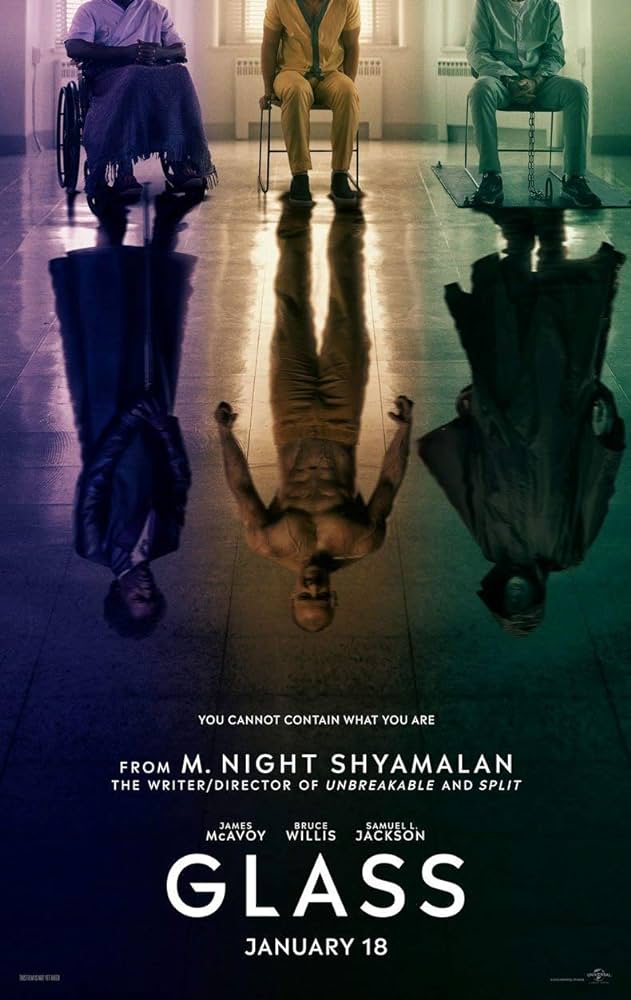
David Dunn is unbreakable. Hard to hurt and gifted with superhuman strength, he tries to stay one step ahead of the law while delivering vigilante justice on the streets of Philadelphia. His special talents soon put him on a collision course with The Beast, a psychotic superhuman with 24 distinct personalities known as The Horde. Their showdown leads to them being arrested, landing them both in a special hospital run by a doctor with a mysterious agenda, and right into the waiting clutches of Elijah Price, the criminal mastermind known as Mr. Glass, who has plans for them both.
I’ve talked about my feelings toward M. Night’s work before.
In a nutshell, I think he’s a good filmmaker who relys on the same rug-pulling trick far too often, even when that rug-pull doesn’t work, and because of this, for the most part, I’ve never really been all that into his stuff. But after attending a Q&A he gave after an advanced screening of Split at Fantastic Fest one year, his self-awareness, his drive to create, his reasons for making movies, especially mid-budget genre stuff, and his inspirations and his goals, were really appealing and relatable, and I felt a kinship with him when it comes to that drive to create these kinds of stories.
I still haven’t really liked his last couple of fims, but still, I’ll always turn out to check out his new stuff from now on, because at the very least, I can appreciate where he’s coming from and why he’s doing it.
Also, whenever anyone makes a big show of mispronouncing his name, that’s super racist, just fyi… super fucking racist. Don’t do that.
So, despite not being the biggest fan of Shymalan’s work, my favorites have always been the Eastrail 177 Trilogy, a series that includes the films Unbreakable, Split, and Glass. This shouldn’t surprise anyone, as they overlap towards some of my own well-known areas of interest, superheroes and comicbooks. But on top of just that, of all the “what if superheroes were in the real world” shows and movies we were plagued with in the aughts, that boring, crappy, colorless, unimaginative, and ashamed of its roots, “emos in hoodies” genre that gave us such tedious garbage as Heroes, Mutant X, Birds of Prey, the 4400, and The Cape, just to name a few, Shymalan’s Eastrail 177 Trilogy is far and away the best example of the kind of thing that this particular genre was always striving for.
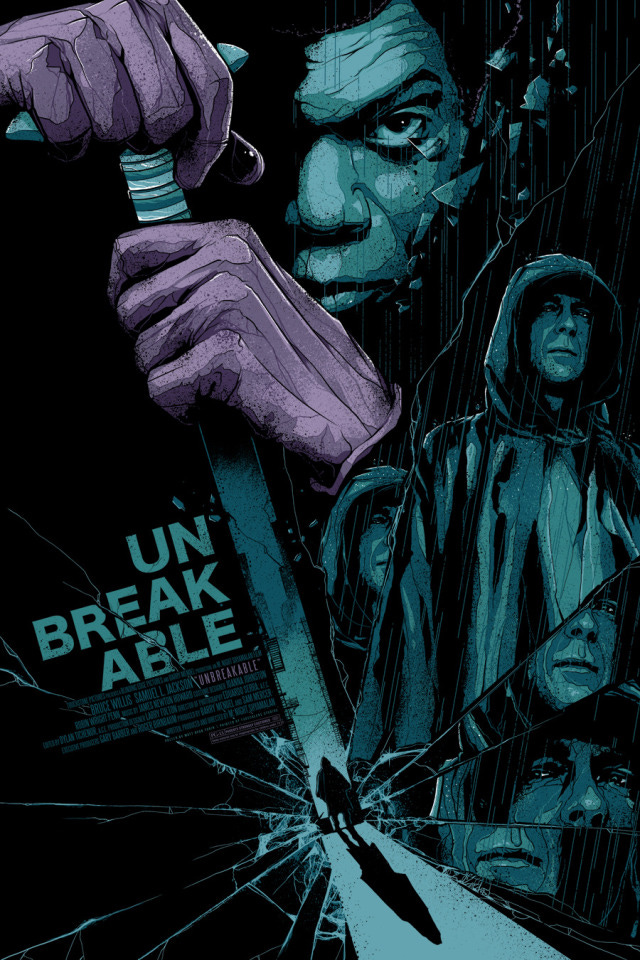
The Eastrail 177 Trilogy began with Unbreakable in 2000.
Telling the story of David Dunn, the only survivor of the horrific Eastrail 177 train crash, Unbreakable is about a man discovering he is superhuman. This leads to him also discovering that the crash was caused by a man named Elijah Price, a wheelchair-bound man suffering from Osteogenesis imperfecta, otherwise known as Brittle Bone Disease.
Elijah is a genius and a comic book obsessive. He believes that many of humanity’s myths and legends that inspired many superhero comics are all true. Elijah believes that he himself is a supervillain, and theorizes that since he exists, then his opposite must also exist, that somewhere out there there, there must be a superhero, someone strong and invulnerable. To prove his theory, he arranged disasters, each one resulting in the deaths of hundreds, all to see if anyone survived, to see if anyine emerged relatively unscathed.
Finally, with the crash of Eastrail 177, he was rewarded with David Dunn, the hero to his villain, the two sides to the same coin.
Shymalan stated upon Unbreakable’s release that it was intended to be the first in a planned trilogy, but by the time Split came out sixteen years later, this had basically been all but forgotten.
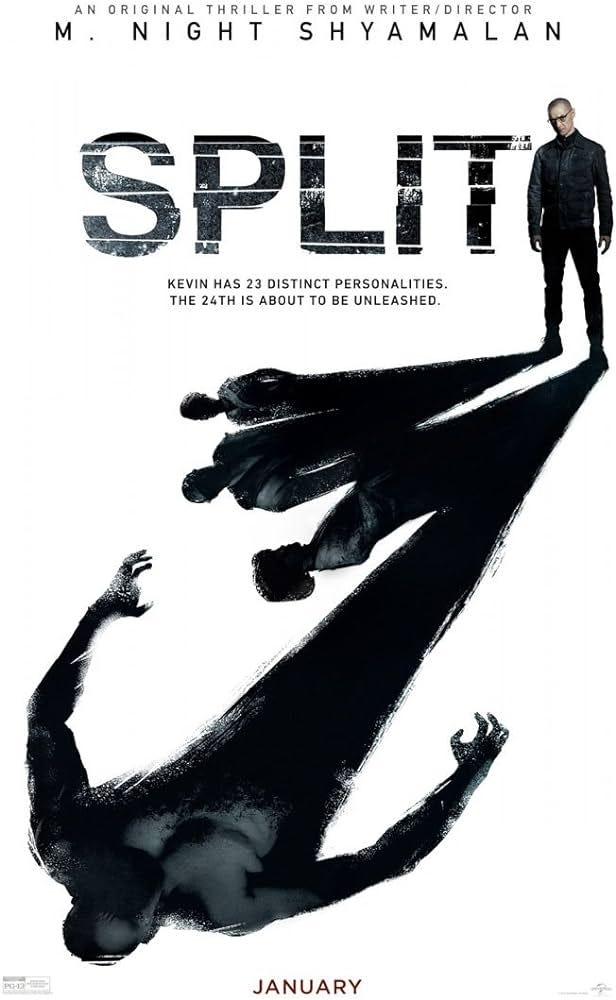
Split is the story of a man named Kevin Wendall Crumb.
Kevin suffers from a fictionally dramatic but factually inaccurate version of Dissociative Identity Disorder (DID), what used to be known as “Split Personalities.” He struggles under the strain of 23 different and distinct personalities, made all the worse as some of them have banded together in an alliance called The Horde. They have done this in preparation for the coming of a 24th personality, a monster called The Beast.
In order to bring the Beast forth, The Horde has kidnapped three cheerleaders to sacrifice, and it is up to one of those cheerleaders, Casey Cooke, to escape and fight back, but in the end, all her efforts are for naught, and she is only able to survive by reaching Kevin through all the noise of The Beast, and his supplicants in The Horde, and through their shared history of abuse, forge a connection that is able to stop him from going on a rampage.
But then, at the end of the film, we see a diner, and a line of people sitting at the counter all watching the news reports of this recent event. The crowd comments on how The Horde sounds like a supervillain’s name, and one of them wonders… Wasn’t there another supervillain recently? What was that guy’s name? At which point, David Dunn is revealed to be sitting at the same counter, and he sighs and says: “Mr. Glass.”
This reveal was a huge surprise, and audiences loved it, as Unbreakable is one of Shymalan’s most loved films. Which is how we ended up here, the third and final film in the Eastrail 177 Trilogy, Glass. I know what you’re thinking… Do I need to watch the other two films if I want to watch this one? Sure, yeah. Why not? They’re pretty good, so might as well. But also… No. No, you don’t have to watch them. This film catches you up pretty good. You’ll figure it out.
So…
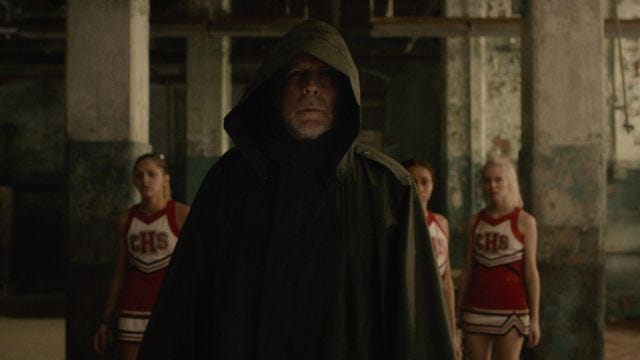
Now, David Dunn is secretly a vigilante on the streets of Philedelphia. A former college football prodigy turned security guard, now the owner of a home security store, he dons his hooded green poncho and patrols the city streets, stopping crimes, helping other, kicking the asses that need to be kicked, all while his son, Josh, sits at the computer in the back of the shop, and talks to him via an earpiece, providing support and live updates from the internet and the police scanner.
His hero persona is known by many names… The Overseer. The Green Guard or The Green Guardian. The Tip Toe Man. The Enforcer. The Protector. None of these names are very good, but still, David loves that there are people talking about him, that they are beginning to turn to him, hoping for his help. He’s starting to make a difference out there, and he feels alive while doing it, because this is his calling, this is what he was born to do, but also, this is all he has…
Save for his son, he is all alone.
But things can get pretty serious pretty quickly when you play at hero. Escalation, they call it. Especially once you start making too much noise and the wrong people begin to notice. So, even though his son cautions him to slow down, to be careful, to take a break… David can’t help it. He’s out there, more and more, pushing his luck. Because while there are a few pictures of David in action, most are blurry and quick, and despite his growing reputation, many still believe that the stories of a superstrong man in a hooded poncho, protecting the innocent and meting out justice to the deserving, to be nothing more than an urban legend…
But the cops know he’s real, and they’re looking for him.
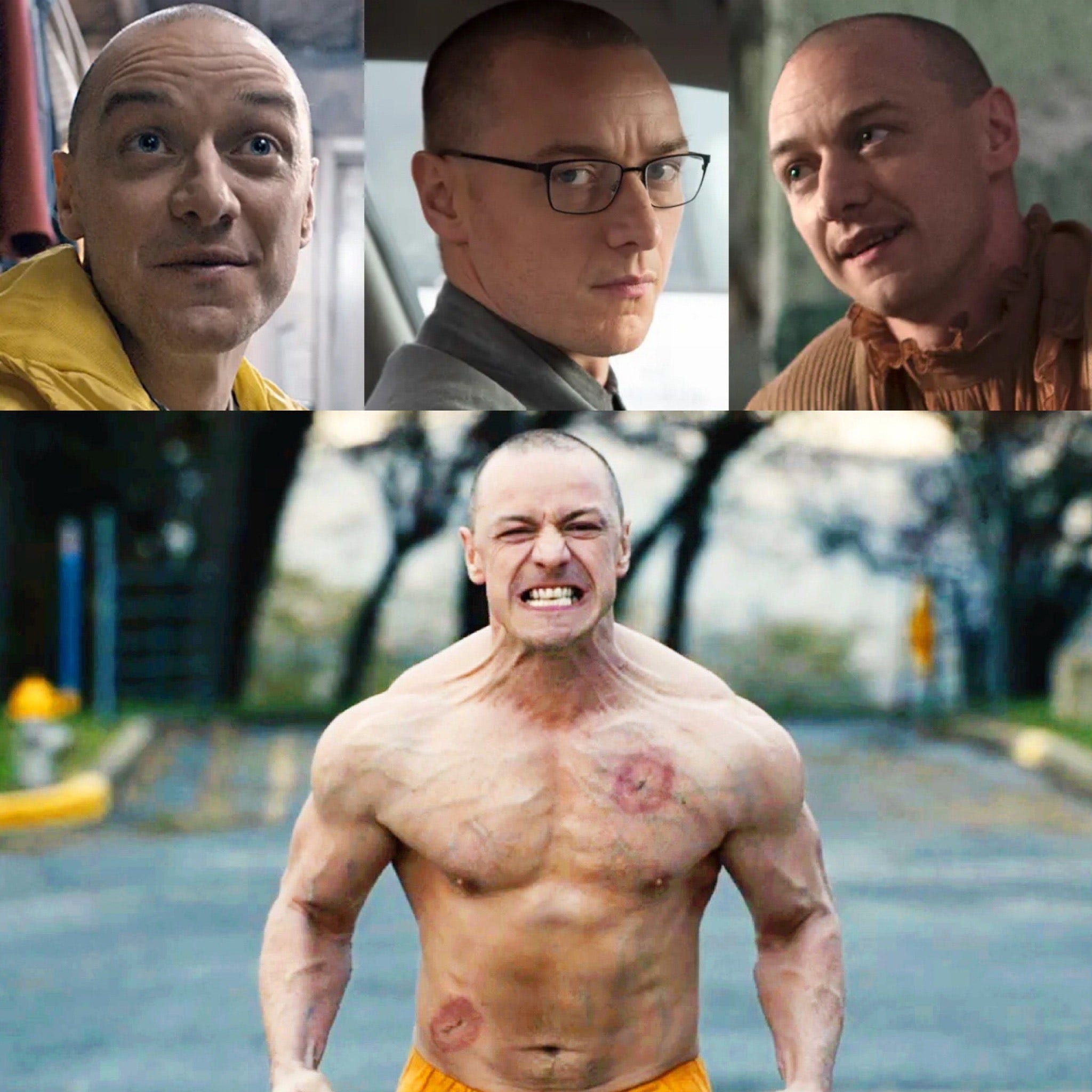
Meanwhile… While the majority of the 24 separate personalities that reside in Kevin Wendell Crumb’s mind are not evil, unfortunately, three dominant personalities have taken over by banding together in an alliance called The Horde.
First, there’s Hedwig, a 9-year-old boy. He loves to draw and to dance, and is a big fan of Kanye, so he’s only kind of evil, but not really. Hedwig is responsible for keeping the former dominant personality, Barry—a nice, effeminate fashion designer—from "the light," which is what they call it when a personality is “in the driving seat.” Then there’s Dennis, one of Kevin’s oldest personalities. He is a cold, intelligent, and tough older man who enjoys watching young girls dance naked. And then there’s Patricia, a soft spoken, but extremely dangerous and very manipulative British woman. She is considered to be the high priestess of The Horde.
The Horde are devout believers in the service of The Beast, a superhumanly strong, nigh-invulnerable, flesh-eating monster who believes only those who have endured immense suffering and loss are worthy to live, and is now on a quest to wipe out the "Impure," which is basically everyone, except Casey Cooke.
When David Dunn finally manages to catch up to Kevin, freeing the fresh batch of cheerleaders he has snatched, the cops are waiting, interrupting the first titanic tussle of these two titans, and bringing them both down with surprising ease, as the cops somehow seemed to know both of their weaknesses…
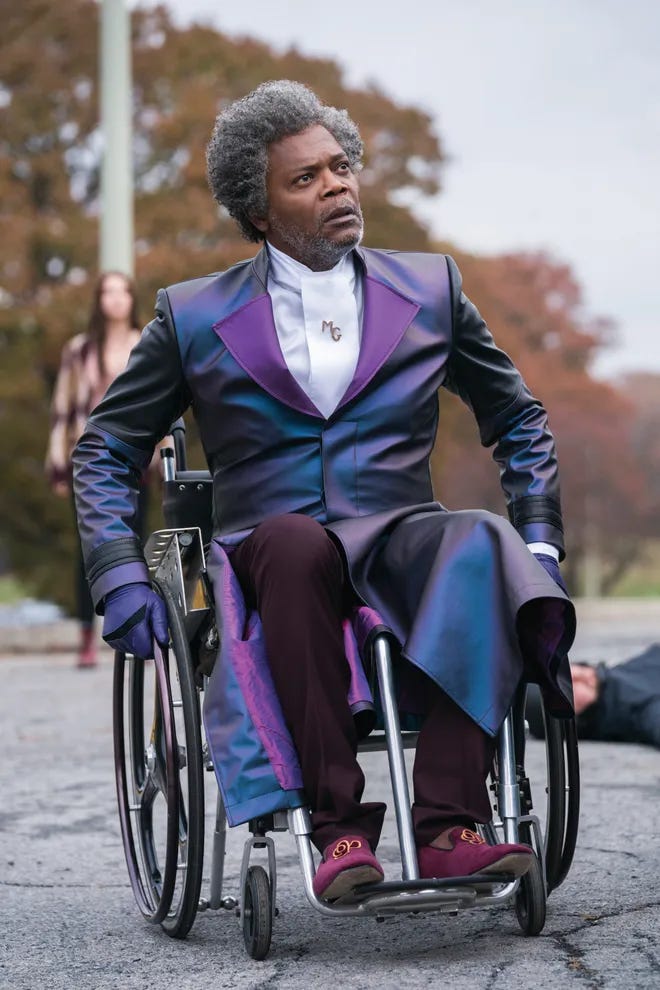
Elijah Price prefers to be called Mr. Glass.
He is a smooth-rolling cat who knows all the angles, a man who never lets his very easily broken bones slow him down. As David Dunn's archenemy, and former mentor, as well as the owner of the "Limited Edition" comic shop/art gallery, he is a dangerous genius, personally responsible for orchestrating several tragedies that killed hundreds, all in an effort to draw out another superhuman. A true supervillain, it is through his efforts that both David Dunn and Kevin Wendell Crumb now exist as they are, and it is also directly due to those efforts that he was caught, convicted, and left to languish, seemingly catatonic, in the Raven Hill Memorial Psychiatric Hospital, forgotten by all but his mother, Mrs. Price.
But Mr. Glass knows many secrets, and he has been playing a long game. And when David Dunn and Kevin Wendell Crumb are both captured by the police, they also end up in the Raven Hill Memorial Psychiatric Hospital…
“There are unknown forces that don’t want us to realize what we are truly capable of.”
When it comes to supervillains like Mr. Glass, there’s always a real plan…
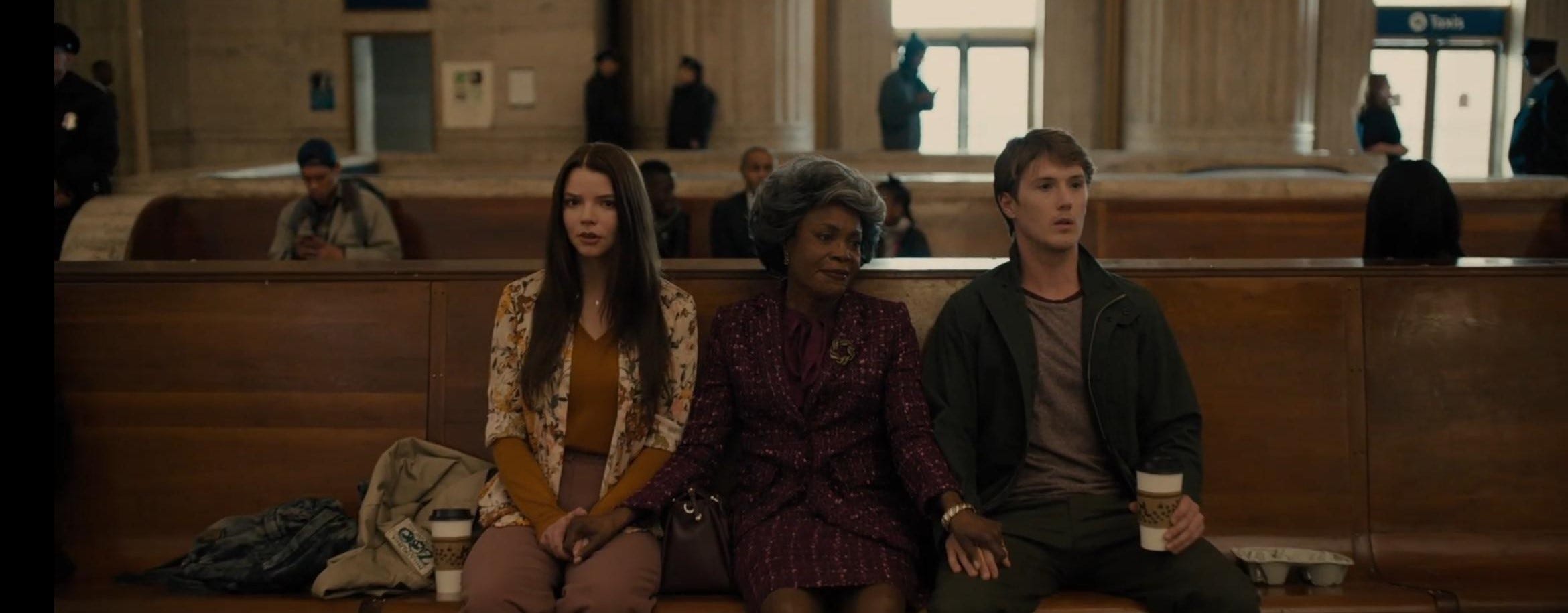
Casey, Mrs. Price, and Joseph are all helplessly caught up in the tide of great forces, witnesses to the birth of a new world, as David, Kevin, and Elijah are turned over to the care of a mysterious doctor named Dr. Ellie Staple.
Dr. Staple specializes in a very particular kind of delusion of grandeur, people who believe that they are superheroes, so she sets about trying to convince her three new patients that they are not super in any way, that there is a rational explanation for all of this, that they’re just normal people… normal people with a mental illness. She has three days to try to treat these men by whatever means necessary, which could include torture and lobotomies.
But in actuality, Dr. Staple is the tip of the spear of an ancient organization known as The Black Clover, its members all marked by a tiny tattoo of a black cloverleaf. They are a powerful secret society with the singular objective of suppressing and pacifiying any and all emerging superhumans before their existance is known to humanity. They exist to maintain a status quo forged thousands of years ago with the deaths of the last gods. They are a group set on maintaining the balance that keeps order, keeps peace, and keeps the world from becoming extraordinary.
“They got it wrong in the comics. They talk about secret evil groups trying to stop the heroes. I don't think we are particularly evil, and we don't choose sides. We try to stop both of you. If there is one of you, the opposite of you appears, it escalates, we step in. There just can't be gods amongst us. It's not fair — things were just fine for ten thousand years, our way.”
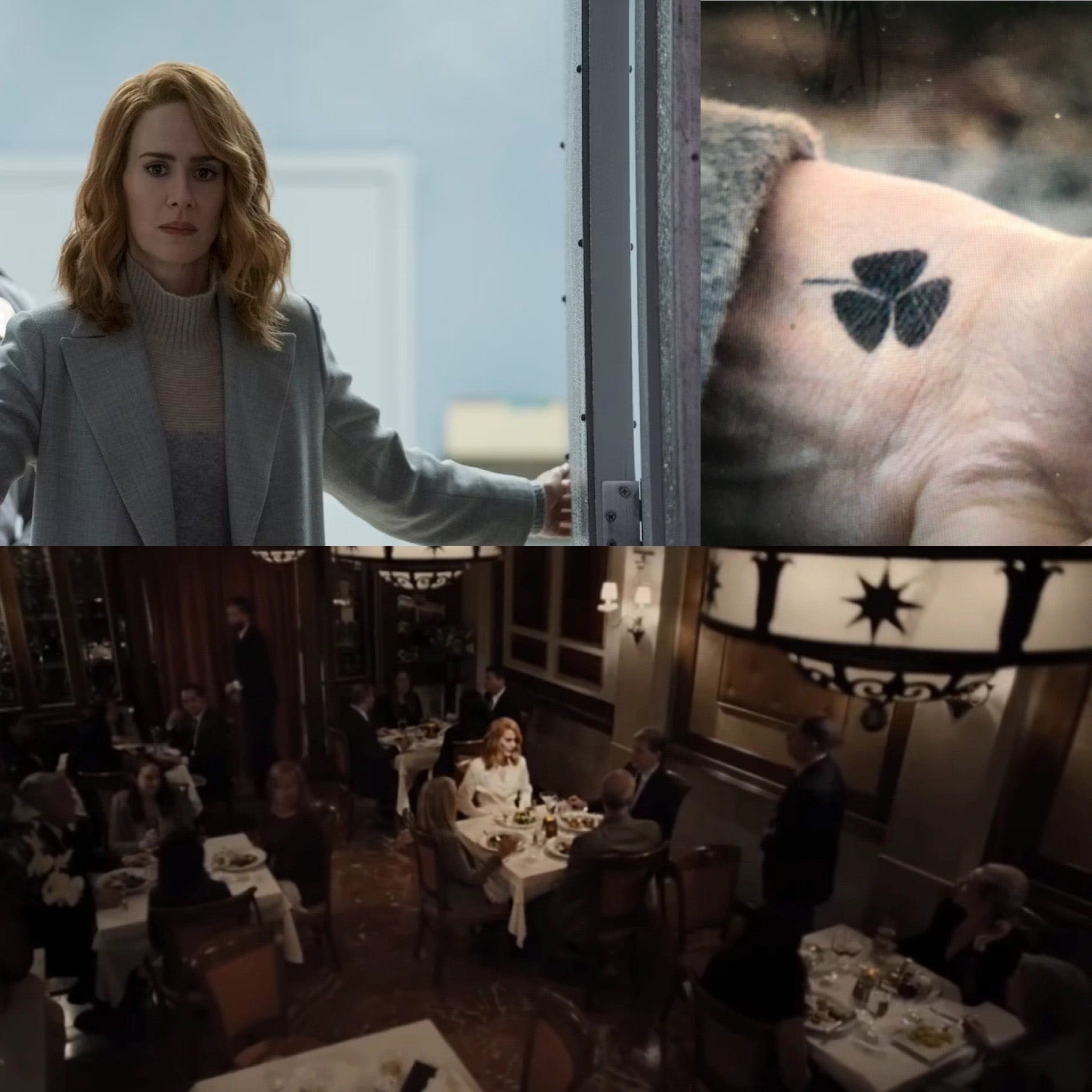
Mr. Glass means to see the Black Clover fall.
After that, it’s all just a pot of water slowly coming to boil.
Honestly, I would love a show about a world secretly ruled by the Black Clover, and the superhumans they attempt to destroy. I love the idea of a secret society that has been killing Gods for centuries in order to maintain their rule of humanity. It’s a concept that sounds very similar to one of my favorite comics of all time.
But as for the movie itself, it almost works.
Almost, but not quite. The themes of untreated mental illness, of isolation, of avoiding reality, of avoiding confronting your actual problems, and the harm that it can cause you while doing so, are all kind of there, but also not really.
There’s a color scheme going on here of green, yellow, and purple too, but I can’t quite put my finger on what it’s supposed to mean, if anything. I asusme it has something to do with the kind of unspoken traditional comic book primary color codes of character design, mostly because this is something that was specifically talked about in the first film in the Eastrail 177 trilogy, Unbreakable, but the fact that these particular colors are often primarily connected to supervillians kind of muddys the waters a bit here for me, so if that’s it, then I have no idea what Shymalan was trying to say with it.
There’s a chance that these colors have some kind of connection to various emotions that the particular characaters might possibly represent, or maybe it’s for a particular mental illness that each characater represents, I don’t know. I couldn’t quite nail that down anywhere in any kind of satisfactory way either.
Admittedly, I could be missing the point somewhere, but I don’t think so.
It’s possible it could all just be meaningless, nothing more than the film’s chosen aesthetic, but given Shymalan’s usual level of output, and the way his films often fail at fully and completely connecting in the end, I’m leaning more toward the idea that the meaning was just lost in a poor execution.
I’m actually a huge fan of the climax of this film. I know a lot of people were really upset by it, but I loved it. Not just is it great for showing the cold reality of that world, and why it all has to come done, but because, for the first time in a long time, one of Shymalan’s rug pulls is not only unexpected, but it works. It works, because it’s the type of twist that isn’t based so much on the surprise, as it is the misdirection. You are fully expecting one thing, and you don’t get it, because much like Mr. Glass’s entire plan, that wasn’t the actual intent. I thought that was really good.
Plus, I also love it because if there’s one thing that fandom hates, it’s being misdirected. Simply put, one of the best extra cherries you get on top of a pop culture sundae is when the whiny manbaby and pick-me girl fans fill their diapers every time they think a movie isn’t serving their interests enough. That’s the case here, as Glass drowns those overgrown babies’ superhero dreams in a muddy puddle. So, much like Ned’s death, or the Red Wedding, or the Red Viper’s death in Game of Thrones, or the ol’ Mandarin switcheroo that happens in Iron Man 3, Glass is one of those things that pisses off the right people.
Which is always great, whether the rest of the film actually works or not.
In the end, for all the pieces of this film that I truly truly loved, for the most part, it just doesn’t quite come together, and, for me at least, fails to hit the more interesting notes nearly hard enough. This is a movie that comes within sight of being great, but is neither a horseshoe, nor a hand grenade, so we can only really apprecite it for it’s individual parts, and not the whole.
Fingers crossed on the Black Clover TV show happening at some point! We can will it into existence, if we just believe hard enough!
